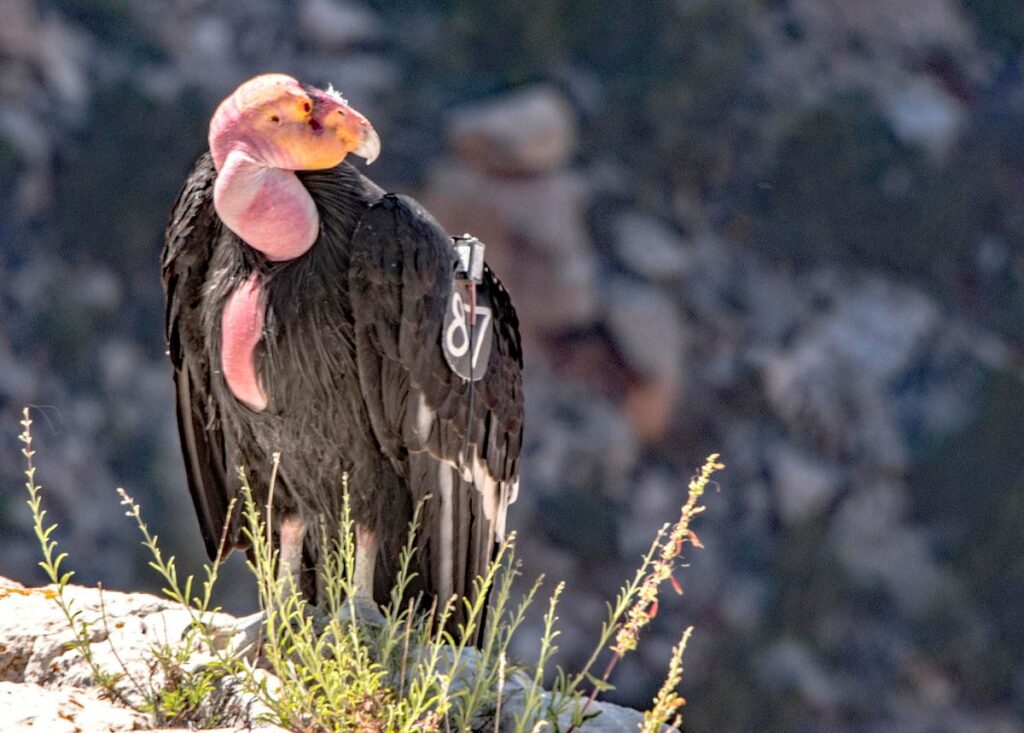A tagged California condor. (Photo by: Education Images/Universal Images Group via Getty Images)
In their continuing efforts to protect California condors from avian influenza, conservation biologists have moved one step closer. Following a successful trial involving black vultures, researchers now have begun vaccinating the endangered raptors. Last week, three birds received the vaccine. More birds will be vaccinated this week.
The vaccine being used is manufactured by Zoetis and targets highly pathogenic avian influenza. In 2016, the U.S. Department of Agriculture awarded Zoetis a conditional license to administer this vaccine to poultry. However, the safety and efficacy of the vaccine in condors had not previously been examined. To begin the evaluation process, researchers at the Carolina Raptor Center first tested the vaccine in black vultures. From this trial, they made two vital observations. First, none of the birds showed any vaccine-associated side effects. Second, all the vaccinated birds developed antibodies. Based on these positive results, researchers began the next step in the process, vaccinating condors.
Understandably, researchers are proceeding cautiously. Even though the vaccine seems to be safe in black vultures, they wanted to confirm that it also is safe in condors. That’s why only three birds were vaccinated initially. According to an update provided by the U.S. Fish & Wildlife Service on Friday, none of those birds showed any significant side effects. Thus, the vaccination program is being expanded.
As they did with the black vultures, the condors involved in the trial are being divided into three groups. One group will receive a single shot. One group will receive two shots, spaced three weeks apart. The final group will not be vaccinated. The concentration of avian influenza virus antibodies in all birds will be determined 21 and 42 days after vaccination. Presumably, the condors that received the vaccine will have significantly higher antibody levels in their blood than their unvaccinated counterparts. Ideally, the group of condors that received only a single shot will exhibit reasonably high levels. These results will be available later this year.
Will the presence of antibodies in the vaccinated raptors mean that the threat of avian influenza to California condors has been eliminated? Unfortunately, no. Additional obstacles remain.
First, the vaccine is being administered only to captive condors. There is no immediate plan to capture and vaccinate condors living in the wild. Thus, even if the vaccine is highly effective, these birds would remain at risk. Second, we don’t know how effective the vaccine will be. The study conducted at the Carolina Raptor Center showed that the vaccine resulted in the production of antibodies in black vultures. Presumably, the same result will be observed in condors. But the presence of antibodies does not necessarily mean that the vaccine prevents disease or death. We can assume that a robust antibody response in an animal will decrease the likelihood of that animal becoming sick. But no vaccine is 100% effective.
Perhaps a more vexing problem is the ever-changing nature of the virus itself. As we’ve all learned during the Covid-19 pandemic, viruses change over time. That’s been true of SARS-CoV-2. It’s true of avian influenza viruses. The vaccine currently being tested was developed in response to the 2015 outbreak of highly pathogenic avian influenza in the United States. But researchers from the University of Maryland argue that today’s HPAI is fundamentally different. In 2015, they note, the virus had a tremendous impact on poultry. Wild birds, in contrast, were not greatly affected. That has changed. During the current outbreak, various wild birds, from cormorants to egrets to owls to California condors, have suffered. The virus clearly has changed and a new vaccine, better matched to the new strain of the virus, probably is needed. The development of that new vaccine, however, will take time. Meanwhile, conservation biologists working to protect California condors hope that the current vaccine is good enough.


